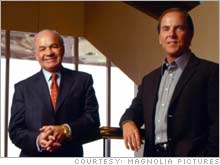|
The guiltiest guys in the room In the end, Ken Lay and Jeff Skilling couldn't escape their own lies. And that's good for corporate America.
(FORTUNE Magazine) -- The most innovative company in corporate America. That's what FORTUNE called Enron for six years running, from 1995 through 2000. It was an "extraordinary" and "unique" business, concluded a respected Goldman Sachs analyst in early 2001. When we wrote our first expose of the company, nine months before it collapsed into bankruptcy, we coyly compared it to Hollywood's reigning "it girls," Jennifer Lopez and Kate Hudson, because Wall Street was virtually drooling over the stock. Those memories were hard to conjure in the somber environment of the Houston federal courthouse on May 25, when a jury of eight women and four men convicted former Enron CEOs Ken Lay and Jeff Skilling of conspiracy and fraud. Guilty! ... Guilty! ... Guilty! Judge Sim Lake's reading of the jury's findings had a staccato rhythm to it. Lay, who was standing not with his lawyers but in the front row of spectators close by his wife, Linda, clutching her hand, turned red, his face strained. Skilling responded with a peculiar smirk. The prosecutors remained impassive, but celebrated later that evening at a Houston tapas restaurant, clearly relieved to have won.
Let's acknowledge some unambiguously positive implications of the Enron verdict. First, it finally offers a measure of consolation - or retribution - for those employees who lost everything in Enron's bankruptcy. And it reinforces a critical notion about our justice system: that, despite much punditry to the contrary, being rich and spending millions on a crack criminal defense team does not necessarily buy freedom. The verdict was also good for short-sellers, who have been much pilloried of late but who were the first to raise questions about whether Enron's extraordinary numbers added up. Their early warning system certainly proved valuable. (And by the way, the verdict delivers a measure of vindication to the press as well: The Wall Street Journal was a front-and-center culprit in the defense's version of events, which the jury roundly rejected.) The most important implication of the verdict, though, is the lesson it delivers for business itself. In the beginning it seemed such a simple story, demanding swift justice: A highflying company disappeared almost overnight; a CEO bolted before the collapse; top executives sold tens of millions of dollars worth of stock - some of it secretly - while employees and investors were left with nothing. Yet in the five years that followed - as government investigators devoted countless hours to unraveling the Enron riddle - many experts opined that a case against the two former CEOs wasn't winnable. The accounting issues were just too complicated. The tactic that the prosecutors ultimately used, to great success, was to make the case about lies. And the truth is that the tragedy of Enron revolves not around the numbers but around the people. Skilling was never more compelling than when he described - virtually misty-eyed - how he built Enron's trading operations, which came to dominate the business. It was clear he put the company above everything else in his life, including family. "I loved Enron," he pointedly declared. Yet that obsession was his undoing. We saw how Skilling fudged the numbers - and the truth - to keep Wall Street happy and hide Enron's problems. But the company found itself deeper and deeper in the hole, ever closer to the edge of disaster. Lay, for his part, returned as CEO after Skilling's August 2001 resignation to find himself in a thicket of business problems. With his own sinking financial fortunes wedded to Enron's stock, he foolishly engaged in public denial, insisting that all was well and desperately hoping that such blithe boosterism would make it so. He continued to live a pasha's lifestyle, funding it with massive loans and by secretly unloading his own Enron shares. "These men did not try to put the company into bankruptcy," prosecutor Sean Berkowitz told the jury in his closing argument. "They felt if they could just hold on, if they could just lie a little bit longer and get to the next quarter and the next quarter and the next year, everything would be fine.... They figured the market wouldn't understand. They were arrogant, and they decided what the market heard and what the market didn't hear." In a triumph of common sense, the jury seems to have clearly understood all that. Rather than demonize Skilling and Lay - or even the company - they correctly viewed the two CEOs as gifted, albeit flawed, men. Juror Wendy Vaughan, a small-business owner, called Lay and Skilling "brilliant" and said she admired much of what they had done at Enron. "I wanted very, very badly to believe what they were saying - very much so." But the evidence, including their own testimony, had simply made that impossible, she said. As jury foreperson Deborah Smith put it, "We learned to respect and like the defendants, but we tried to keep that separate from the decision we had to make." The verdict in Houston is a critical landmark - and a good thing - for American business. The rules are now clear and the risks of another Enron that much lower. The message is not to start down the slippery slope - that fudging the numbers, operating deeply in the gray zone, deliberately obscuring what's going on in your business, isn't just wrong. It's a crime. Enron's bankruptcy seems not to have delivered this message, as the subsequent accounting scandals at AIG and Fannie Mae, which originated with the same please-the-Street impulses (but without such dire results), showed. But maybe, just maybe, a couple of decades in the slammer for Ken Lay and Jeff Skilling will send the message home. Lay, Skilling face hard road. Click here. |
|

